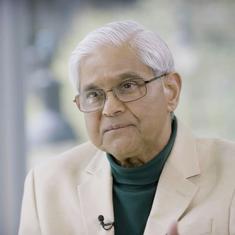It is a measure of the divisions that the Bharatiya Janata Party has engendered that a letter of instruction from the Archbishop of the Delhi Diocese to its churches to pray for the nation is being construed as an attack on the Narendra Modi-led government.
The Sangh-sympathising section of media claim that the note is an instance of church interference in politics, and Hindutva hell-raisers on television and the social networks have characterised the church’s call for a prayer campaign as #churchvsmodi and #churchagainstmodi.
Since the letter and the prayer are of a general nature, referencing constitutional values and democratic institutions, it’s worth asking why Modi’s most ardent supporters see this as an attack on him.
Is it that in his letter to his diocese calling for a campaign of prayer, the archbishop of Delhi Anil Couto writes, “We are witnessing a turbulent political atmosphere that poses a threat to the democratic principles enshrined in our constitution and the secular fabric of the nation”?
This is something that many, including Yashwant Sinha, former BJP MP, Union minister and until recently a leading light of the party’s “margadarshak mandal”, also feel. The archbishop has blamed no individual or political party or government for this state of affairs. Sinha, on the other hand, has. In a recent interview he said: “…this is the most worrisome aspect of the NDA rule of the last four years, this division of society into sections. …It has resulted in violence in various parts,...”. He goes on to say, “…What the BJP is now trying to do is to create a fear of the minorities in the mind of the majority community.” He says it is being done entirely for the BJP’s political gain and “…they [the BJP] don’t count the damage it is doing to our social fabric and the future of this country.”
The disproportionate response to the archbishop’s letter should be seen as part of this effort to “create a fear of minorities in the mind of the majority community”.
A patriotic yagya
A “Rashtra Raksha MahaYagya” (a Yagya to protect the nation) was held in Delhi earlier this year. It evoked no comment. These were prayers, the organisers said, for among other things, the protection of the Constitution, to ensure every citizen voted, for freedom from corruption and the end of terrorism, communalism and casteism. This Yagya drew no comment. Indeed party MPs and union ministers participated in it.
The prayer that the Archbishop’s letter instructs churches to say once a week is not very different in its expectations from the Yagya. It is a prayer to protect the Constitution, institutions and the marginalised and to kindle honest patriotism. It is unexceptional and should ordinarily have appealed to all people such as believe in the power of prayer to help move things along.
That it didn’t and has instead evoked responses like “Mullahs and Padres will never tolerate the BJP” only confirms what Sinha set out so clearly: the BJP wants to “create a fear of minorities in the mind of the majority community”. The BJP government and its supporters in the media are simply fear mongering when they ask “Why does the church want Modi out in 2019?”
One Hindutva votary tweeted, “They [the Church] seem to be keen to create a Hindu backlash in favour of Modi.” It is a comment on the state of the nation today that a call to prayer for the nation by a Church leader who represents a fraction of 3% of the country’s population could conceivably produce a “Hindu backlash”. This is Modi’s legacy.











